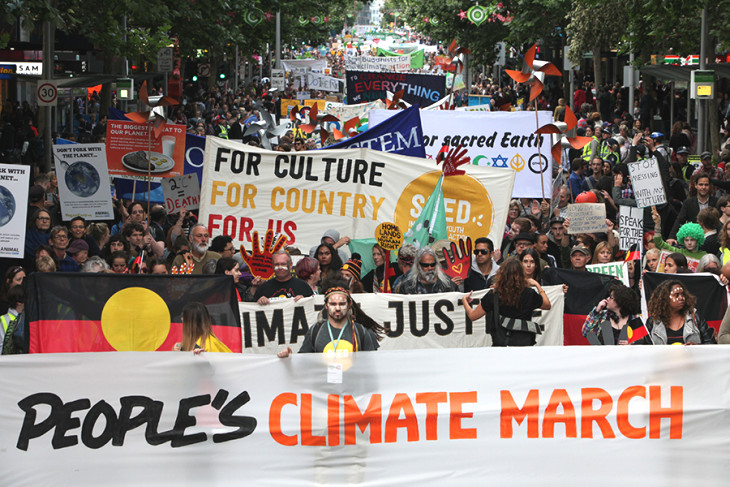
La marche globale pour le climat à Melbourne, en Australie, a commencé la série des marches, mobilisant des dixaines de milliers de participants.
Ce fut un coup de pouce pour les habitants de Paris: ceux qui ne pouvaient pas marcher eux-mêmes parce la grande marche prévue avait été interdite pour des raisons de sécurité, et pour ceux qui se sont rassemblés dans la capitale française pour participer en tant que délégués, observateurs, journalistes, lobbyistes, représentants de la société civile.
C'était vraiment la plus grande participation de citoyens jamais achevée pour la protection du climat et la solidarité. Des centaines de milliers de personnes ont défié tous les obstacles aux marches. Quelques 2300 événements dans 175 pays ont été enregistrés dans le monde entier. Peut-être encore plus petits événements qui n'ont jamais été enrégistrés dans le compte rendu officiel, mais qui ont également contribué à le chœur mondiale.
Mundus maris a participé à Düsseldorf
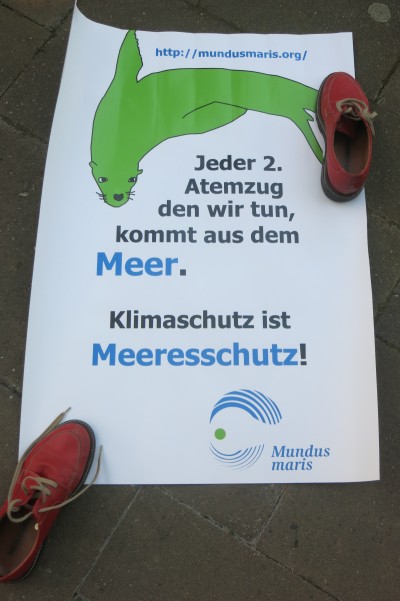 Organised by an initiative of people already at the centre of last year's climate march on 21 September, this year's support group and sponsorship grew encouragingly.
Organised by an initiative of people already at the centre of last year's climate march on 21 September, this year's support group and sponsorship grew encouragingly.
With Maik Willmes, Nick Goedeking, Mattes Liebsch and Prof. Dr. Gößling, the core team kept inspiring others to participate and engage.
Among others, sponsors comprised a company promoting renewables and electricity savings and the local savings bank (Stadtsparkasse).
Günter Karen-Jungen, green Mayor of Düsseldorf, offered his patronage.
The event in the Bohème Quarter of the state capital combined moderation, short informative talks with lots of live music by Mrs. Brightside and her band and ample opportunities for chats among participants.
11:00 h - Welcome by the mayor of the state capital Düsseldorf
11:15 h – Live - Music
11:30 h – Prof. Claus Gößling: What is climate change about? Background remarks
11:45 h – Live - Music
11:50 h - Mattes Liebsch: Presentation of the 10-Point-Plan - what can I do myself
12:05 Uhr – Live - Musik
12:15 Uhr – Nick Goedeking: Climate Change – Background info about the UN Summit in Paris
12:30 h – Live - Music
12:35 h - Jörg Heynkes: The role of small and medium sized companies in counteracting climate change
12:42 h – Carmela Melstroem – what can very small companies do?
12:50 h – Live - Music
13:00 Uhr – Prof. Claus Gößling & Mattes Liebsch: 10-Point-Plan - some more advice
13:15 h – Live - Music
13:20 h – Discussion with Experts
13:55 h – Closing Remarks
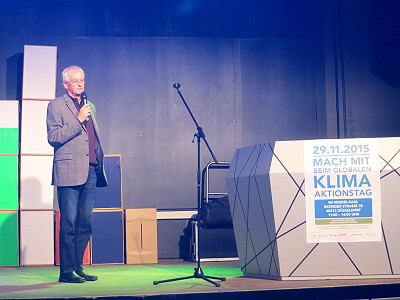 Mayor Karen-Jungen welcomed participants and expressed the commitment of the city council to strengthen climate mitigation measures of all public administrations as well as subsidising energy-saving measures of citizens and companies.
Mayor Karen-Jungen welcomed participants and expressed the commitment of the city council to strengthen climate mitigation measures of all public administrations as well as subsidising energy-saving measures of citizens and companies.
A lighthouse project was the new hyper-efficient electricity plant that provided central heating as well and was billed as currently the most advanced in the world.
But the city was also investing in climate proofing its car fleet, increasing energy efficiency of public buildings and promoted practical action by citizens as well.
The watchword was - nobody can do it alone, but everybody can do something.
Prof. Dr. C. Gößling followed up on this theme and explained the physical principles behind the greenhouse effect and its initally beneficial effects on our planet's climate.
Echoing the results of the last assessment report of the Intergovernmental Panel on Climate Change (IPCC) he noted that the each of the last three decades had increased average temperatures compared to the previous one.
The CO2 emission of an "average" German was a whopping 11 tons/year (some estimates are even as high as 12.5 tons). That includes emissions not provoked by the individual directly, but arising from different services and institutions, such as health care, the military, the industrial food system etc.
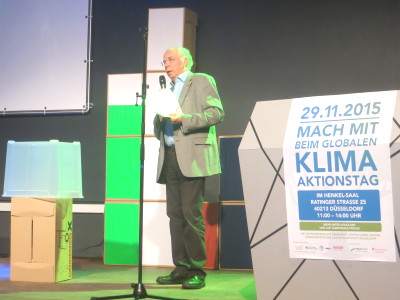 The thinning of ice shields and melting of glaciers around the world. The warming ocean has increased sea levels in the last century by 19 cm, more than in the previous 2000 years.
The thinning of ice shields and melting of glaciers around the world. The warming ocean has increased sea levels in the last century by 19 cm, more than in the previous 2000 years.
We can measure current change compared to past states. It is difficult to predict the future. Therefore, scientists develop scenarios based on different types of behaviour of people, companies and entire societies.
Strong immediate efforts to stop further CO2 emissions offer hope to keep warming at the end of this century to about 2°C as proposed to the UN Climate Summit in Paris starting tomorrow.
However, if business continues "as usual" - as still seems to be the case despite much talk - we are heading towards a world that will be 3 to 5°C warmer on average at the end of this century.
Nobody can predict with certainty how Earth will look like. The climate models available at the moment can not describe such a regime very well.
We do know, however, that only the one degree increase experienced so far has already led to more extreme weather events, lots of damage to people and infrastructure and that tropical animals such as corals already die en masse because their temperature tolerance is exhausted.
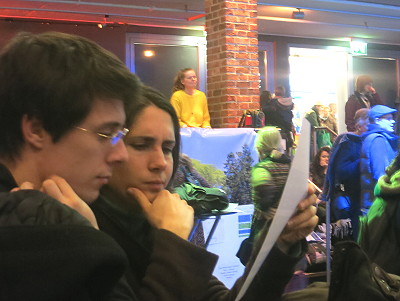 Focusing on what can and must be done to prevent warming from running totally out of control, the organisers presented a 10-point-plan for immediate action.
Focusing on what can and must be done to prevent warming from running totally out of control, the organisers presented a 10-point-plan for immediate action.
The plan addresses the four big areas of average annual CO2 emissions by German citizens:
- mobility (2.4 tons)
- consumption and food (4.5 tons)
- electricity (0.8 tons)
- heating (1.8 tons).
Advice covers suggestions such as taking more bicycle rides instead of the car, avoid air travel if possible, reduce meat consumption, chose a utility providing electricity from renewable sources, abolish the stand-by mode of household appliances, and insulate your house or appartment.
Click here to download the 10-point-plan for immediate climate action (in German).
There was plenty of opportunity to get more information about how to put these and other measures into action. We heard from Jörg Heynkes of the Chamber of Commerce that losing or gaining money makes entrepreneurs sit up and listen to what consumers want in terms of climate friendly products and services.
A children's corner offered painting and tinkering and Mrs. Brigthside and her live band lifted the spirit with a wide spectrum of music.
Catch the atmosphere by clicking on the link to the video. Click here fore more info on climate solutions. All pics on this page by Cornelia E Nauen.
La marche virtuelle à Brussels
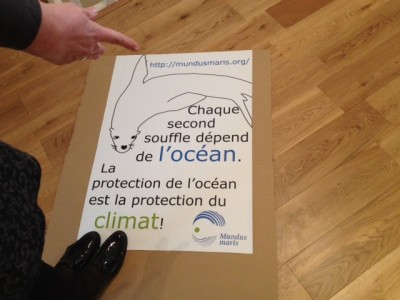 In Brussels security concerns led to several false starts - gathering on 29 November at noon on the central Grand Place - yes, no, yes ....
In Brussels security concerns led to several false starts - gathering on 29 November at noon on the central Grand Place - yes, no, yes ....
To play it safe, there were several smaller activities all geared to exchange about what was at stake for our future at the Paris Summit and showing solidarity not only with the victims of the Paris and Beirut attacks, but with refugees fleeing violence and destruction of their environment and with all those in need.
In one of the events, participants recalled specifically the role of the ocean for climate stabilisation and life on Earth.
Felicitas, Marcos, Marianne, Regine, Peter, Manuela, Rafa, Nadia, Dorothea.... participated in a virtual march for the climate and sent this picture.
This wonderful multigenerational initiative made a pledge to take practical steps to protect the climate through something within their means they could do in their own daily lives. An example to follow! Let it become thousands, millions doing likewise.
Des jeunes au Sénégal envoient leur message
Grâce à des enseignants particulièrement engagés, plusieurs classes d'école au Sénégal ont élaboré des idées pour la Conférences des Nations Unies sur le Changement climatique à Paris. Ils se sont focalisées sur ce qui est important pour un avenir rassuré pour eux-mêmes et leur familles.
Magath Diop, Directeur de l'école Khadim à Hann, a donné la responsabilité pour l'exercice à son jeune collègue, M. Mbodj, qui nous a envoyé quelques photos et le message fort de Fatou FALL, 12 ans, qui s'est prononcée au nom de tous:
Ecoliers du monde, mobilisons-nous contre le rechauffement climatique. Vraiment ça chauffe et menace.
Dans la nuit du 30 août 2015, les riverains de la Baie de Hann au Sénégal n'ont pas dormi jusqu'au petit matin. En effet, la Mer, notre voisine malade, a détruit des maisons, des pirogues, emporté des habits, des médicaments et des ustensils. Le lendemain, les autorités ont parlé des conséquences du rechauffement climatique:
Chers parents, arrêtez des émissions de gaz à effet de serre. Nous avons peur des sécheresses, des maladies, de la faim et des inondations.
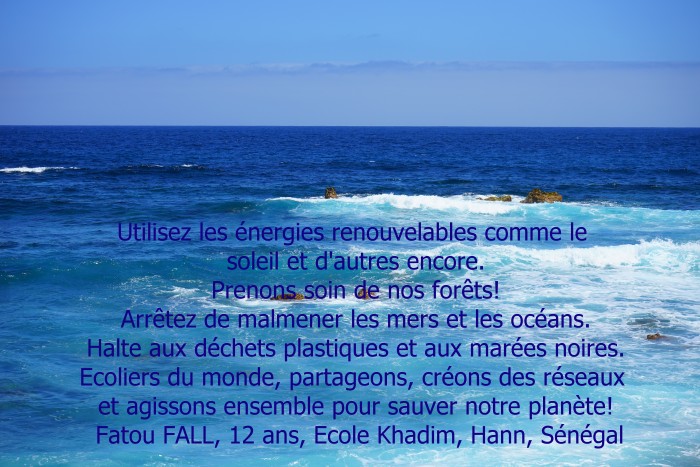
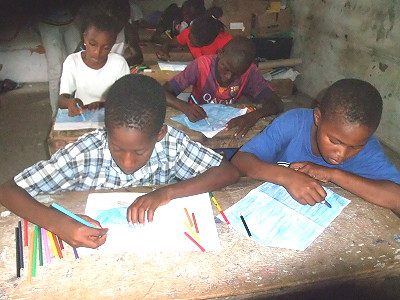 |
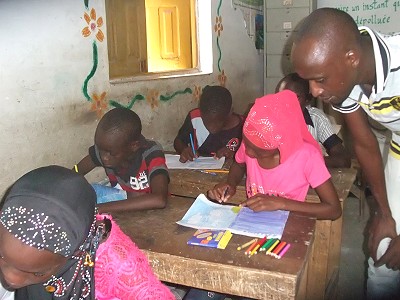 |
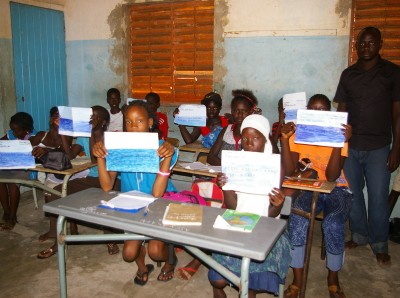 Mamadou Camara est un enseignant à l'école élémentaire Tafsir Demba Sall 2 à Mbour.
Mamadou Camara est un enseignant à l'école élémentaire Tafsir Demba Sall 2 à Mbour.
Il est fortement engagé à améliorer les conditions pour l'avenir de ses élèves et de toute la communauté.
Il a envoyé une autre série de photos avec souhaits et des conseils pour le Sommet.
Que ces voix soient entendues et prises en compte pour que ces enfants ont un avenir en sécurité dans leur propre pays, grâce aussi à la coopération et aux échanges internationaux.
Cliquez ici pour la vidéo avec «Une mer d'idées pour la Conférence des Nations Unies sur les changements climatiques»
 |
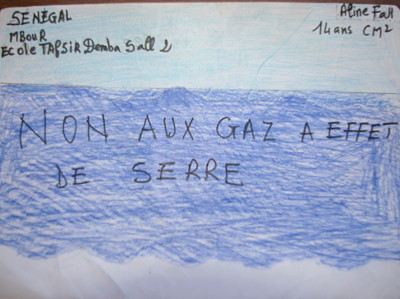 |
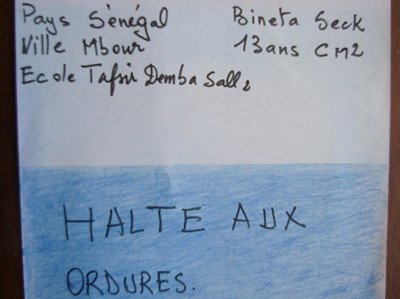 |
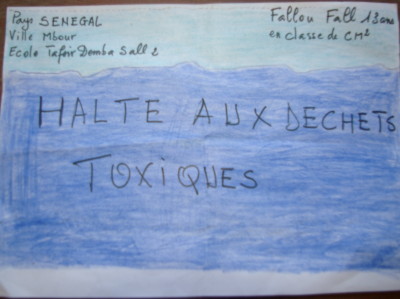 |
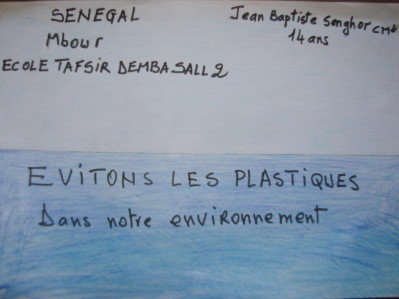 |
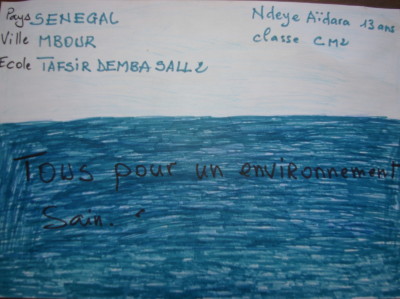 |
 |
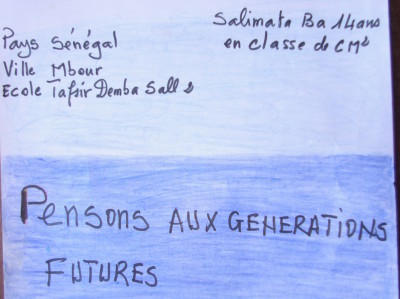 |
Le reste est de l'histoire...
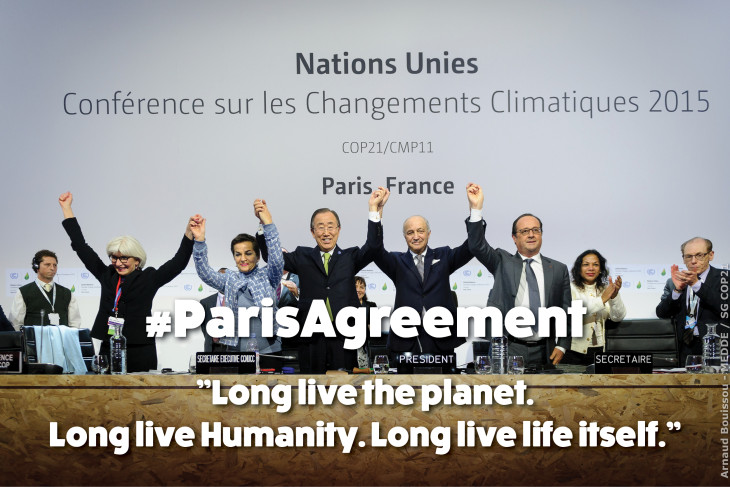
Les représentants officiels de 195 pays ont convenu au cours des dernières heures du Sommet climatique de l'ONU l'bjectif commun de maintenir le réchauffement climatique en dessous de 2°C à la fin de ce siècle. Les engagements qu'ils ont publiquement pris ne correspondent pas encore à la cible, mais les gouvernements ont également convenu d'examiner la performance d'un chacun tous les cinq ans et donc ouvrant la porte à des améliorations ultérieures.
La demande pour une élimination rapide de énergies fossiles était politiquement impossible compte tenu de l'opposition des pays dont l'économie dépend massivement sur le pétrole et le gaz, comme l'Arabie saoudite.
C'est une victoire des innombrables personnes qui ont travaillé sur la compréhension du changement climatique, sur la sensibilisation du public, sur le déclenchement des mouvements citoyens et des mesures d'action précoce.
A partir de maintenant, l'accent est placé sur la mise en œuvre de tous les engagements déjà pris et de combler les lacunes pour atteindre l'objectif d'émissions zéro aussi vite que possible. Les organisations de la société civile à travers le monde sont bien avisées de se concentrer sur le suivi de la réalisation et de contribuer à élargir et à approfondir des autres engagements. Non seulement tout le monde peut faire sa part, si petite qu'elle soit, mais les gros émetteurs comme l'industrie du transport aérien et maritime ont également besoin de se soumettre à ce régime, étant donné que, ensemble, elles représentent déjà environ 6% des émissions mondiales avec tendence à la hausse.
Nous sommes heureux d'avoir contribué à ce résultat encourageant du Sommet, mais nous savons aussi que beaucoup de travail reste à faire pour permettre les grandes transformations économiques et techniques nécessaires de se produire d'une manière socialement acceptable.














